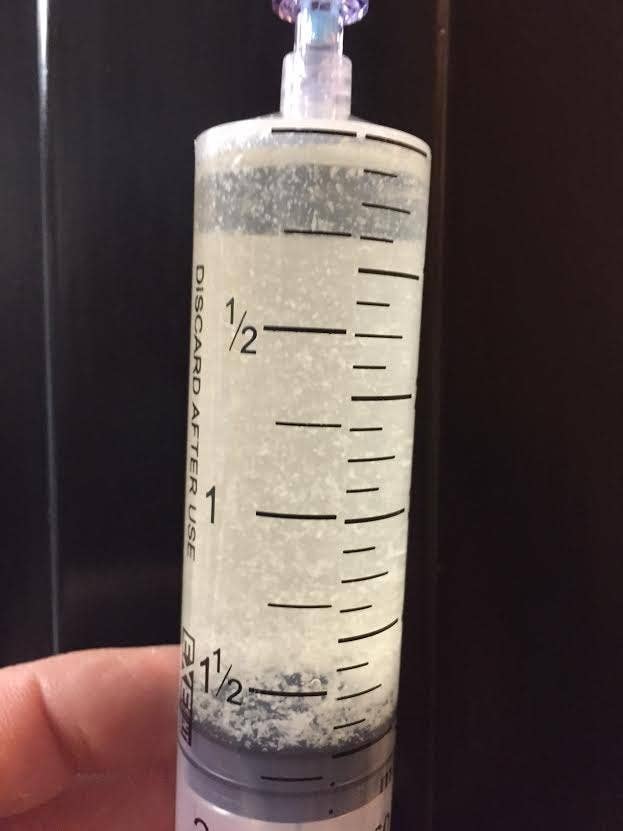
The state of Georgia is withholding the results of an experiment about what caused the state's execution drugs to go bad — despite promising that the results would be released.
Officials proposed the experiment shortly after an execution was called off because the drug solution was discovered to have particles floating in it.
Georgia Department of Corrections General Counsel Robert Jones proposed a simple experiment to help determine why the drugs set to be used in Kelly Gissendaner's scheduled execution in March ended up like this.
Jones, in an affidavit filed by the Georgia Attorney General's Office, told a federal judge that the results of the experiment would be given to the court, and to lawyers for inmate Gissendaner, who nearly had the cloudy drugs injected into her.
Two months later, the experiment is done. But Georgia is now withholding the results. It is unclear when, or if, the results will ever be made public.
The state contends that the most likely cause for its pentobarbital to "precipitate" is because of the temperature in which it was stored. However, their own expert says it also could have been caused by deficiencies in how the drug was mixed.
Back in March, Jones proposed that the pharmacist, who compounds the drug in secret, would mix up another batch. Some of the drug would be stored in a cooling unit at 37 degrees, like Georgia did last time. The rest of the drug would be stored closer to room temperature, which is what their expert now advises.
"These samples will be photographed and closely monitored for seven days," Jones said in an affidavit. "This test should confirm whether the problem with the drugs that were to be used in the Gissendaner execution was that they were stored at too cold a temperature."
If the colder drugs turn cloudy but the warmer drugs are fine, that would hint that the temperature was a cause. If both samples turned out to be unacceptable, then that would indicate problems with its compounding. Jones added that it was the Department of Corrections' intention to provide the results to the court and to Gissendander, which has not happened.
"Those [photographs and results] are currently classified and confidential," Department of Corrections spokesperson Gwendolyn Hogan told BuzzFeed News. The department also denied an open records request, citing attorney-client privilege.
Hogan added that "when and if privileged and classified documents are released is up to the agency's attorney," which would be Attorney General Sam Olens.
Olens's office would only say that the results are "privileged." A spokesperson would not say if the results will ever be made public.
Even before Georgia proposed the experiment that it now wants to hide, Gissendaner's attorney worried about the investigation being biased.
The state "will not be merely the subject of this investigation; they will also conduct it," attorney Gerald King wrote in March. "And they will hide all critical aspects of their self-assessment from Ms. Gissendaner, the public, and this Court."
"A self-investigation with opaque results is unacceptable."
Georgia sent samples of its cloudy drug to two testing labs in March. The labs determined that the pentobarbital "precipitated" — meaning that solid versions of the drug appeared in the solution.
Georgia has indefinitely postponed its executions while it sorts out what went wrong.
King argues that his client can't be executed, because she "endured hours of unconstitutional torment and uncertainty" while the state decided whether or not to use the drug. Georgia has pushed to have the suit dismissed, and Gissendaner is expected to file a response this week.
